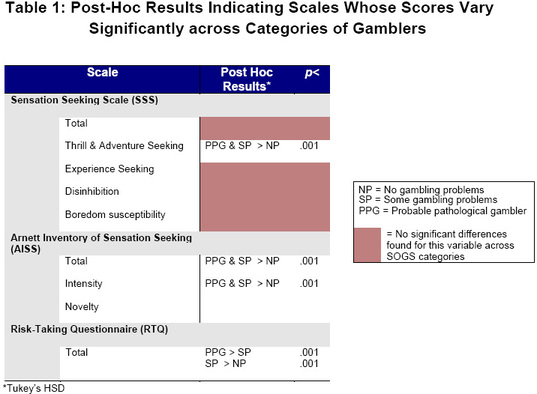The WAGER, Vol 4(35) – Back to School: Gambling & Correlates among University Students
Risk-taking and sensation-seeking are perennial topics of study for those interested in compulsive gambling [see WAGER issues 4(14), 3(36), and 3(2)]. Many of the studies have addressed possible correlations between these two factors and pathological gambling. Powell, Hardoon, Derevensky, and Gupta (1999) attempt to expand the scope of such research by examining risk-taking and sensation-seeking in all categories of gamblers: those with no problems, those with some problems, and those that are classified as probable pathological by the SOGS.
The authors used a university sample of 28 males and 30 females which included 11 probable pathological gamblers, 24 problem gamblers, and 23 subjects with no gambling problems. Subjects were administered Zuckerman’s Sensation Seeking Scale (SSS), the Arnett Inventory of Sensation Seeking (AISS), the Risk-Taking Questionnaire (RTQ), and the South Oaks Gambling Screen (SOGS). The SSS and the AISS are both made up of subscales, which are listed in the table below. Of the research questions posed by the authors, one in particular differentiates their work from that of previous studies: Are any of these measures capable of distinguishing pathological from non-pathological gamblers? 
Multiple comparison procedures (ANOVA and post-hoc analyses) were performed on the data, producing the findings illustrated in the first table. The AISS and its Intensity subscale were capable of distinguishing non-problem gamblers from the other groups, as was the Thrill and Adventure Seeking subscale of the SSS. However, only the RTQ was able to differentiate probable pathological gamblers from problem gamblers, and problem gamblers from gamblers with no problems.
interesting to note what role, if any, is played by risk-taking.
Source: Powell, J., Hardoon, K., Derevensky, J.L., & Gupta, R. (1999). Gambling and risk-taking behavior among university students. Substance Use & Misuse, 34, 1167-1184.
The WAGER is funded, in part, by the National Center for Responsible Gaming, the Massachusetts Department of Public Health, the Andrews Foundation, the Addiction Technology Transfer Center of New England, the Substance Abuse and Mental Health Administration Services, and the Center for Substance Abuse Treatment.